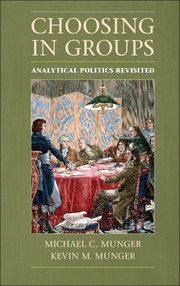7 - The Social Choice Problem: Impossibility
Published online by Cambridge University Press: 05 February 2015
Summary
George: It is unthinkable that [someone] could manipulate the democratic process.
Dotty: Democracy is all in the head…
George: …Furthermore, I had a vote!
Dotty: It’s not the voting that’s democracy, it’s the counting.
Tom Stoppard, Jumpers, Act I, p. 35.Until now, we have made two simplifying assumptions. First, society makes all of its collective decisions by some variant of majority rule. Second, spatial utility functions can represent preference orderings. However “social choice” theorists work in a much broader context than spatial preferences or majority rule. Their goal is to select the most general possible representation of preferences, and the most encompassing possible conception of institutions. These generalizations require some careful definitions.
Social Choice
Social choice analyzes alternative decision rules, or deciding how to decide. We have discussed in this book a hierarchy of choices, and it is important to understand the differences.
Deciding how to decide how to decide: Are we a group? Are we going to kill each other, or cooperate? How will we constitute ourselves?
Deciding how to decide: What decision rule will we use, and what are the rules for changing the rules, in our constitution?
Deciding: What will be our policies and everyday political decision about speed limits, budgets, and regulation of pollution, in the context of a constituted group with relatively fixed formal decision rules and amendment processes?
- Type
- Chapter
- Information
- Choosing in GroupsAnalytical Politics Revisited, pp. 135 - 158Publisher: Cambridge University PressPrint publication year: 2015

